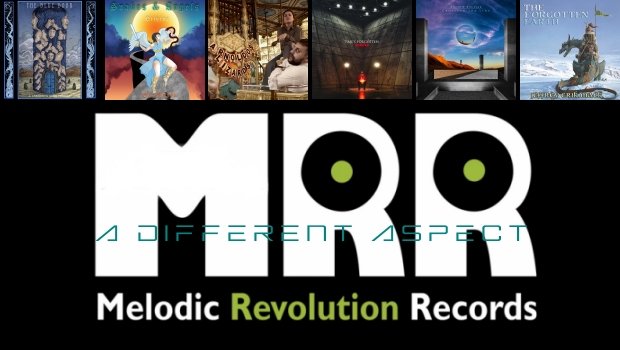Featured artists: A Gardening Club Project | GorMusik | Arnoldo’s Lizards | Time’s Forgotten | Andrew Roussak | Jeffrey Erik Mack ||:
It’s all in the title. David Edwards & Nick Hudson take a look at some of the recent releases from the Melodic Revolution Records (MRR) label:
• A Gardening Club Project – The Blue Door
• GorMusik – Snakes and Angels (Origins)
• Arnoldo’s Lizards – Satanic Attack or Divine Punishment
• Time’s Forgotten – Shelter
• Andrew Roussak – Crossing the Line
• Jeffrey Erik Mack – The Forgotten Earth
David Edwards
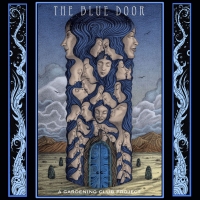
Martin Springett is a very talented fellow. The widely travelled septuagenarian ex-pat has followed a successful and diverse career as an award-winning fantasy and children’s illustrator and author over the years. He emigrated to the West Coast of Canada back in 1965 but has been based in Toronto since 1978. His distinctive artwork can be seen on many album covers, graphic novels and magazine, and I noticed more recently that he provided the cover art to the three volumes of The Progressive Underground – Kev Rowland’s retrospective compilation of his album reviews.
However, music has always played a large part in Martin’s life, and he released his first album, The Gardening Club, back in 1983, but it was not till 2018 that he resurrected this musical project with The Riddle and then Boy On A Bike in 2020. Several EPs have followed, but it is his latest album, The Blue Door, under the name of A Gardening Club Project, that came to my attention when it was released in late 2021 on Melodic Revolution Records.
Like his previous works, Martin’s vocals and acoustic and electric guitar work is supplemented by contributions from a variety of guest musicians. Drew Birston provides acoustic and electric bass and Kevin Laliberte is behind the keyboards, drum/percussion programming and general arrangements. Sari Alesh provides some expressive violin on a couple of tracks, with Wayne Kozak’s saxophone on I Dream U.
Recorded remotely during the pandemic, The Blue Door is a haunting guitar-led blending of folk, prog and Middle Eastern-influenced strings and percussion, that has a melancholic feeling of loneliness, but with moments of hope and optimism. Whilst instrumentally sparse and intimate much of the time, there are still moments where the music and vocals combine to create a surprising depth and layering of the sound.
There are 10 tracks in total, starting with the flowing instrumental My Muse and I (Overture), with melodic guitar patterns over a percussive, shuffling beat. Although separate songs in their own right, the album plays best if these are considered to be interweaving parts of the whole. Going North has an acoustic guitar foundation, with bass, electric guitar, drums and a violin solo contributing to a sense of unease, over which Martin’s dreamy, ebbing and flowing vocals create a hypnotic atmosphere.
Two Houses has a sad, desolate feel, with piano and keyboard string effects providing a lovely touch at odds with a sense of alienation and loss. The Blue Door is all swaying, dreamy rhythm with stabs of jazz-style guitar, keyboards and yearning lyrics looking at what memories might lie behind the said door.
The Path Not Taken is a short instrumental which is the most prog rock track on the album, with more urgent electric guitar and driving beat. Personally, I’d have loved to have seen it extended further, as it had the potential to explore other interesting avenues. Winter Snow has a similar, sad feel to the earlier tracks, with some effective fretless bass and engaging electric guitar patterns towards the end. At times Martin seems to be reciting poetry against a musical background, rather than fully-integrated musical lyrics – but that is a minor quibble as they have great beauty and poignancy to them.
The Eastern, percussive feel is emphasised further with the instrumental, guitar-led Mirage. It continues with flowing The Turning of the Glass, with a cappella vocal harmonies introducing some mystical acoustic and electric guitar shapes that blossom into an accessible and optimistic refrain. I Dream U follows in a similar vein, but with a more noticeable, dreamy, folky feel and the percussion creating the feeling that you are in a hot Zanzibar coffee house listening to local musicians, rather than in your own house. Martin handles the mystical lyrics of dreams, memories and our experiences and surroundings well, and the track is lifted by a short but soaring soprano saxophone solo.
The final track, Long Tailed Flight, is an extended instrumental that adds flamenco-like guitar to the hypnotic and swirling Saharan desert soundscape, with the violin – whether with staccato pulses or soaring flights of melody – taking the music to distant lands. An excellent way to end an intriguing and hypnotic album.
Martin has created a fine blend of acoustic and electric folk, world music and prog rock influences that, whilst having a common, Eastern-tinged, acoustic musical feel, also has variety and depth, revealing itself with repeated plays. Not necessarily ‘prog’ but definitely progressive, and worth exploring further, not least for the stunning CD artwork.
David Edwards
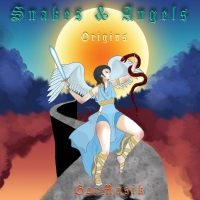
Gordon Bennett is an accomplished and experienced American guitarist steeped in the prog rock and jazz fusion he grew up with in the ’70s. Having played guitar for almost 50 years, he has produced a diverse range of progressive music in that time, with jazz and classical influences mixing with new age, electronica, electric and acoustic rock, amongst others.
His most recent solo releases have been as GorMusik, where Gordon plays guitar, bass and synth guitar to create the rich keyboard-wash giving the music a real band sound. However, joined by Peter Jones (of Tiger Moth Tales, Red Bazar, Cyan and Camel) on vocals, Joseph Frick on bass, with Jay McGurrin as a guest drummer later on the album, Gordon has created an ambitious, challenging and cinematic prog rock tour-de-force in Snakes and Angels, released in September 2021.
Although a Biblical concept album, it actually focuses more on the struggle between good and evil. It is a rollercoaster of a ride, but one he hopes it will have a positive impact on the progressive rock listener.
At over 18-minutes, The Beginning is eclectic, epic and unexpected with its playful twists and turns. It starts atmospherically, with the distorted words of the Creation spoken, in true Cygnus X-1 style, with galactic effects and sustained keyboard chords before a strumming electric guitar introduces Peter’s clear, expressive vocals as he sings the hopeful lyrics of The Word and The Message. The intensity of the guitar-led instrumentation builds, with the urgent throb of Joseph’s bass and the programmed drumming providing a foundation for several soaring guitar solos from Gordon; first stirring and uplifting and then demonic and frantic. Suddenly, a jovial set of descant vocal harmonies provide an unexpected contrast, and delicate acoustic guitar over the sound of birdsong is followed by an upbeat flamenco-like guitar theme. Heavenly harmonies come and go, and music moves in an idiosyncratic ‘stream of consciousness’ way through to its end. Gordon is clearly following his own muse – wherever it takes him.
The Deception takes us into the Garden of Eden, starting with upbeat, soothing acoustic guitar and synths and Peter’s melodic vocals, but the tone soon turns darker, with strident electric guitar runs and pulsing bass and drums. The distorted, demonic vocals look at our fall from grace and I hear echoes of Neal Morse’s spiritual music at its darkest. The contrast is stark, and Gordon concludes with some amazingly heavy and complex, Devin Townsend-style guitar shredding. The struggle between good and evil is well delineated here.
The Wandering has a desolate feel, with an electronic soundscape and even Eastern-themed synths as mankind now roams through the ‘sands of time’ alone, unloved and “hopelessly lost” – with the vocals now sad and yearning. Prog metal guitar riffing over synthesisers with double speed bass drumming dominates the instrumentation to create the heaviest track on the album. Gordon’s guitar playing is both complex and insistent, before a narration over more soothing music calms down the track and allows us to draw breath, but without losing the unease already generated.
The Lost is my personal highlight. Another lengthy epic (of almost 18-minutes) which begins with resonating acoustic guitar and Jay’s expressive drumming. Peter’s vocals are stunning and flowing synthesisers accompany them as he repeats the refrain; “Shadows fall upon us all”. A chink of optimism fights against the melancholic atmosphere. A lovely, melodic, pipe-led section follows (with Peter on Irish whistles), and it ebbs and flows beautifully through to the end. A marvellous, melodic progressive rock epic that works well enough within the Biblical concept, but also stands proudly on its own merits.
The concluding instrumental, The Lost Orchestra, initially returns us to the unease and uncertainty of earlier. A slow marching drumbeat accompanies the dark synths to start with. However, lush, swirling string effects pick up the tempo. Tribal percussion and richer orchestral sounds conjure up light and shade, before a beautiful, upbeat, symphonic sweep of sound concludes the album – although not before the sound of loneliness and desolation suggests that mankind’s journey is far from over (and may well continue on a future release).
Gordon (Gordo) Bennett, within the GorMusik brand, has created a musically diverse album with Snakes and Angels (sub-titled Origins) that spans majestic, melodic symphonic prog, frantic prog metal, electronica and eclectic and unpredictable progressive passages. His varied guitar influences – including Steve Hackett, Robert Fripp, John McLaughlin, Adrian Belew, Frank Zappa and Alex Lifeson amongst others – are ingrained within the unique musical palette on show. Peter Jones’s superb vocals raise the compositions to a new level and show why he is the ‘go-to’ vocalist for emotive, melodic prog rock. There are real highlights to discover for any open-minded prog listener in this intriguing release, if they are willing to explore – and with The Lost, you have a true melodic prog masterpiece to savour.
Nick Hudson
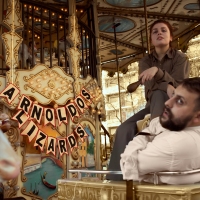
I took on reviewing this debut album from Arnoldo’s Lizards based purely on the band name. I had no idea what type of music a band named as such might sound like, but I wanted to find out. At the time, I didn’t know the title of the album, and when I found that out, it intrigued me even further. So what does the music of Arnoldo’s Lizards sound like? Honestly, I’m not sure just how to describe it, and it may just be one of those albums you just have to listen to to make sense of the sheer insanity of the fusion of sounds within. Three of my favourite albums from 2021 were from Black Country, New Road, black midi, and Squid, and if you enjoyed any of these, I suspect you’ll also enjoy the music of Arnoldo’s Lizards. Not that any of those bands sound anything particularly like each other, let alone Arnoldo’s Lizards, but all four share an exhilarating experimentation that takes listeners on a magical mystery tour to destinations unknown.
As for the so-called ‘Satanic Attack’, it’s more maniacal than demonic. And some of the instrumental and vocal passages are certainly divine, even if others might be more of a punishment to some listeners. It wouldn’t surprise me to find out that either or both of the Argentine duo are classically trained. At times, they almost flirt with something conventional that makes more overt how talented both Alvare Goco and Jack Dimensions are. The sheer eclectic and variety of musical styles that combine and clash together on this album (and within the songs that make it up) will surely alienate and confuse some listeners. But I find myself simply loving it. If I return to the comparison I made with those three post-punk albums from last year, Arnoldo’s brand of post-punk is one without the angularity. Some might suggest that this means they are no longer post-punk, and they would probably be right. I don’t think I’d describe the band as post-punk, and the band don’t describe themselves as such, but their visions and aspirations, and their execution and accomplishments on this debut album have far more similarities than differences to the new wave of post-punk that is peaking now.
I could also make comparisons of the sounds of Arnoldo’s Lizards to classic new wave bands like Blondie and Talking Heads, but at times they are as much Abba as they are Blondie, and occasionally their Latin beats are more Santana than Satanic. Honestly, this band is all over the place sonically. In fact, the chaotic collision of styles really shouldn’t work as well as it does. This should be unlistenable (and I guess some people might say it is), but I can’t stop listening to it. I keep coming back to this album, and if I had come to it earlier, I suspect it may even have made my end of year favourite albums list for 2021. It’s completely and diabolically bonkers, but so am I. The most confusing thing for me, though, is the band’s choice of song to release a video for. Step Wrong / Alive is the least indicative or representative of the album, but who am I to question this decision? All I would say is that regardless of your reaction to this song, I would heartily recommend giving the whole album your attention. It will be well worth your time!
Nick Hudson
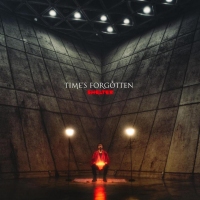
Time’s Forgotten is a band from Costa Rica formed in 2004, but who went on extended hiatus in 2015. They’re back now, with a change in sound and vocalist – or so I have made out from their promotional material. Shelter may be their fourth album, but it’s the first I’ve ever heard. I may still not have heard of them had they not been recommended to me after my review of Involute’s debut as a band I might enjoy. I can hear why the band were recommended to me, but there are probably as many differences as there are similarities, the biggest of which is that, although both bands have female singers, Priscilla Ruiz has a far more traditional prog metal vocal style. But enough of Involute – Shelter quite simply rocks!
I’m not done with Ruiz, though – for she really is the star attraction here. I’m not sure I even want to investigate the band’s previous releases because so much of the atmosphere and energy of Shelter comes from the versatility of Ruiz’s vocals. She can be an absolute powerhouse, coming on like an unstoppable tempest, and she can provide gentler tones for the more ballad styled songs. But this is a generally heavier prog metal beast that allows Ruiz to show her range and power as she rips and roars her way through her lines. Her voice soars over the instruments often, somewhere out there in the stratosphere, but that’s not to say the rest of the backing are lacking, providing a solid wall of sound that’s thoroughly enjoyable. And it’s not standard fare, either. Sure, there are plenty of prog metal hooks and riffs, but there’s some wonderfully melodic passages and others that are nice and jazzy.
There is surprisingly little keyboard high in the mix for this style of prog metal, but when it does rise above the rest and make its presence more known, Juan Pablo Calvo‘s playing really shines. Given that often the keys are my least favourite instrument in most prog metal bands, it is even more surprising that they are probably my favourite instrument on Shelter. They add a great deal to the sound, even when they are not prominent. The rhythm section of Jorge Sobrado (drums) and Gonzalo Trejos (bass) provide a solid groove that’s quite irresistible, and Ari Lotringer plays a mean guitar, with some wicked solos. I don’t know how many of these musicians are from the original incarnation of the band, but they are definitely a band I want to hear more from. If Shelter is a fresh start for Time’s Forgotten, I’m with them from here on.
David Edwards
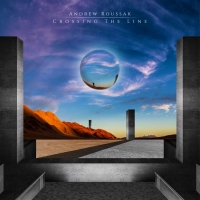
Born in Ufa in Russia, Andrew Roussak is a classically trained pianist who mixes his love of Bach, Chopin and Gershwin with that of the likes of Keith Emerson and Rick Wakeman, and even a dash of the classic rock of Deep Purple. Now living in Germany, he has contributed to several prog metal and progressive albums over the years (including the Tangent’s COMM album in 2011). He has released three previous solo albums; No Trespassing (2008), Blue Intermezzo (2010) and more recently Storm Warning (2019) – but Crossing the Line is his most recent, released in November 2021.
It is very much a solo effort, with Andrew playing or programming all the instruments as well as providing the lead and backing vocals on four of the seven tracks. His virtuoso keyboard playing clearly dominates proceedings but with guitar, bass and percussion added to the mix throughout, it definitely feels like a full band project.
The opening track, Invisible Killer, starts atmospherically, but soon builds up in power and intensity. Inspired by the COVID pandemic, it’s a vibrant mix of ELP/Triumvirat-like keyboards, with surging classic rock guitar riffing and even flashes of Dream Theater-style complexity. Swirling synthesisers and a driving rhythm propel the music forward. Andrew’s vocals have a European ‘operatic’ feel to them, and their emotional content complements the instrumentation perfectly well – but the dynamic music that concludes the track is where the gold lies. A touch of Floydian Eclipse-style vocals conclude this exhilarating and often unsettling opener.
Crossing the Line starts more subtly, with delicate, classical piano passages gradually raising the tempo and then full-blown proggy keyboards are let loose, along with more power guitar riffs. Bass and drums keep everything grounded, throughout the changes of pace, and some lovely stabs of Hammond organ amongst the soaring synthesiser flights. Always inventive, with nods to classic rock as much as prog, it is a piece of music deserving of being the title track.
Against the Tide starts in AOR-style with bright guitars and melodic keyboard chords. The vocals return and Andrew curiously employs a brief mild ‘death metal’ voice between his more theatrically delivered lines. A quieter, piano-led middle section provides a refreshing change of pace and some nice guitar soloing follow before an almost power ballad conclusion. Nation For Sale starts with a hint of the piano on Van Halen’s Right Now before the music builds up and bass, guitar, keyboards and drums combine for a prog-infused slab of accessible mainstream rock, with touches of jazz piano at times.
Acoustic guitar makes an appearance at the start of the Daily Lies. Gradually building up in intensity instrumentally, the vocals suddenly remind me of those of Greek vocalist Jargon, of Verbal Delirium and Drifting Sun. Some lovely keyboards add sparkle towards the end and bring with them a dreamy serenity.
Just One Life has an undulating nature, one minute symphonic and Baroque in feel, the next with driving guitar playing. The harmonised vocals work well and retro-keyboards and ELP references create some nice synergy amongst the instrumental interplay.
The album ends with an extended rock reworking of Jean-Phillipe Rameau’s Suite en la Gavotte et six Doubles. Classical Baroque music mixes with Focus-like prog rock to create an engaging, enjoyable and indulgent album closer that Andrew no doubt enjoyed putting together. Organ and various keyboards have their moment in the sun, and even a touch of Yngwie Malmsteen, Ritchie Blackmore and Jon Lord neo-classical rock at the end to bring a smile to your face.
Andrew Roussak has produced a vibrant and enjoyable collection of melodic symphonic and neo-prog tracks on Crossing the Line, with touches of classic rock, prog-metal and neo-classical influences throughout. There is a variety of musical pace and style shown and once I attuned to his vocal style, I found it perfectly acceptable, complementing the musical flourishes rather well. The lyrics also have a strong, contemporary and emotional content. I think this release could surprise many symphonic prog rock listeners willing to explore further. Recommended.
David Edwards
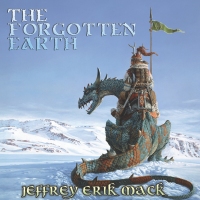
Jeffrey Erik Mack is the highly skilled bass guitarist and composer for American prog rock band Scarlet Hollow, who have been creating some engaging melodic prog rock for over a decade. However, The Forgotten Earth is his debut solo album, released in April 2021. Well over an hour of melodic, instrumental, symphonic prog rock with elements of jazz fusion, Jeffrey has been able to produce a refreshing and engaging album that should suit fans of keyboard-led instrumental progressive rock, supported by some fine bass playing.
A progressive musician influenced by both the progressive giants of Yes, Jethro Tull and Rush (especially the bass of Chris Squire and Geddy Lee), and also the jazz fusion of Jaco Pastorius, Allan Holdsworth and Stanley Clarke, Jeffrey also calls upon his classical music experience to create complex and yet accessible compositions to please the prog community.
“Music is a sonic elixir to life and I want to be that medicine man to folks who do not realize the artistic beauty and sophistication of Prog,” explained Jeffrey when asked why he chose the prog genre for his debut release. Admirable sentiments indeed, and ones he delivers on.
He started composing the material in December 2019 and it has steadily developed over the pandemic period. Although very much a solo release, with Jeffrey playing the majority of the keyboards, along with bass guitar and bass pedal synths, he is joined by Gregg Olson (his Scarlet Hollow bandmate) and Brett Stine on guitar, along with Kristian Terzic on synths and piano and Justin Lepard and Justin Klunk on cello and tenor saxophone respectively, as required.
The album opens up with vibrant The Circus Parable and immediately showcases what the album is all about. Melodic, symphonic prog rock led by atmospheric and expressive keyboards powered by a dominant, twisting bass guitar, with echoes of jazz amongst the more traditional rock elements. Some nice changes of pace and interludes of soaring electric guitar to brighten up the palette.
Sailing the Cosmic Ocean starts with Keith Emerson-like pulses of piano and keyboards with Jeffrey’s bass alternating between both a leading role and a supporting rhythmic one, along with the drums. Maybe more of a jazz fusion feel on this airy instrumental, some serious guitar shredding and a burst of saxophone enlivens proceedings later on. The Witch of Pendle Forest is, unsurprisingly, a darker and mysterious affair with a cinematic, symphonic prog character. Ominous guitar passages and suspenseful keyboards over a flowing beat before a slow fade.
Empire of the Elf (yes, we shouldn’t forget we are in prog country here, folks!) starts with siren-like vocal harmonies before a burst of fast-paced keyboards and synths that would do Rick Wakeman proud. The bass comes more to the fore after this, with the occasional piano-led passages giving the composition space before the epic alternates between light and shade. Enough shifts in tempo and style to keep any prog listener engaged.
Concerto No.2 in B minor III: Allegro (In memory of Rinat Ibragimov) is a modern interpretation of Giovanni Bottesini’s double bass concerto, commemorating the late former double bass virtuoso of the London Symphony Orchestra who died of COVID in 2020. Slabs of majestic ‘Wakemanesque’ keyboards supported by Jeffrey’s weaving bass guitar make this a refreshing change of style and no doubt a heartfelt tribute to the double bass legend.
Architect of Existence is an urgent and undulating progressive track with some fine keyboards and bass complementing each other over complex drum patterns – with a nice touch of piano mid-way. A Farewell to a King is more straightforward melodic symphonic prog; the drums and bass trot along nicely, with the keyboards and synths providing both a strong, tuneful foundation and some enjoyable flights of fancy. An expressive guitar solo towards the end also adds variety to the piece.
Dark Night of the Soul concludes this enjoyable album. Another complex and mood-shifting epic with plenty of proggy keyboard excursions amongst the more emotive bass-driven background. The tempo changes, including several gallops amongst the canters and trots, always keeps this lengthy instrumental refreshingly unpredictable.
Overall, The Forgotten Earth is a well-crafted and harmonious solo debut release from Scarlet Hollow’s bassist and composer, Jeffrey Erik Mack. Keeping a listener engaged with over an hour of complex, symphonic prog instrumentation is no mean feat. The music is sufficiently vibrant, varied and expressive to welcome repeat plays and the jazz fusion elements merge nicely with the melodic prog. Amongst a plethora of such instrumental prog releases every year, I feel this one is definitely worth checking out further.

